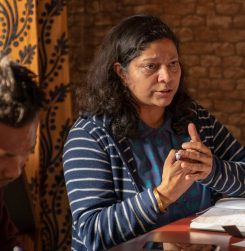
Gufa Talk Series: Women Leadership in Nepali Media
Apr 10, 2019

A BBC journalist has put forth some advice for women who want to take leadership positions in Nepali media/newsrooms.
Rama Parajuli, a planning and commissioning editor of BBC Nepali Service gave five tips while speaking about women leadership in Nepali media at a program organized by Media Foundation.
Some of the key points from her talk:
- 50/50 policy: Nepali Media outlets should reflect their gender ratio and try to achieve 50:50 split. Parajuli said her office BBC Nepali is trying to achieve this. The population ratio of male and female is almost equal in Nepal.
- Competition: Parajuli said women should compete for different positions and not seek positions simply because they are female. “The person who comes through competition can reach up to a leadership position, not the hand pick one,” Parajuli added, “Leadership is not a receiving thing, it’s taking and leading, either you lead or be led.” She encouraged and inspired female journalists to compete by doing hard work.
- Produce original stories: Parajuli said women journalists shouldn’t just limit themselves as news anchors. They should focus on producing original content. Women should also invest in enhancing their knowledge and report on political stories. “Women have to be alert, aware and have to do research,” she said.
- Mentorships: Women journalists should find good mentors who could guide them well. She talked about her in-house mentoring policy at BBC through Global Women in News (GWiN).
- Family and organizational support: One of the reasons women journalists leave journalism is they couldn’t manage family and work commitments. Parajuli suggested family and work commitments should and can be managed. “It important that you communicate properly with your family and address the daily routine with family, friends, and colleagues,” she said. Media organizations and think tanks should also provide training and space for women journalists to enhance their capacities. “If one is serious about the work, it’s not difficult to be in a leadership position,” Parajuli said.
This was the third program in the Gufa Talk series, part of the SCNJIR program supported by Humanity United. Gufa Talk is linked with Media Gufa, a new media-based experiential reporting and writing event where participants are secluded for a rigorous 72-hour session to write stories on the spot.
© Media Foudation- 2024 | Site by: SoftNEP